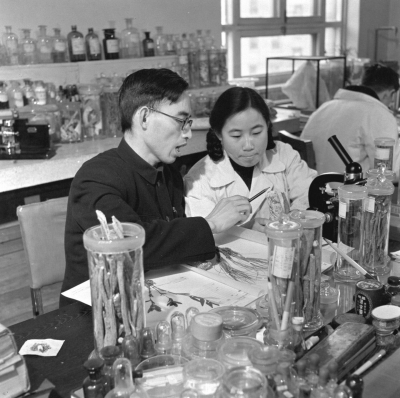
In 1969, during the Vietnam War (1954–75), Tu was appointed to lead Project 523, a covert effort to discover a treatment for malaria. The project was initiated by the Chinese government at the urging of allies in North Vietnam, where malaria had claimed the lives of numerous soldiers. Tu and her team of researchers began by identifying plants with supposed activity against malaria on the basis of information from folk medicine and remedies described in ancient Chinese medical texts. Her team identified some 640 plants and more than 2,000 remedies with potential antimalarial activity and subsequently tested 380 extracts from about 200 of the plant species for their ability to rid malaria-causing Plasmodium parasites from the blood of infected mice. An extract obtained from the sweet wormwood plant (qinghao), Artemisia annua, showed particular promise. In 1971, after refining the extraction process, Tu and colleagues successfully isolated a nontoxic extract from sweet wormwood that effectively eliminated Plasmodium parasites from mice and monkeys. Clinical studies were soon thereafter carried out in malaria patients, in whom sweet wormwood extracts were found to quickly lower fever and reduce parasite levels in the blood. In 1972 Tu and colleagues isolated the active compound in the extracts, which they named qinghaosu, or artemisinin.
Although Tu had relied on information from ancient texts, the works said little about the plant known as qinghao, and many of her team’s early attempts to reproduce their initial findings on the plant’s antimalarial activity failed. Eventually, however, Tu discovered that the leaves of sweet wormwood contain artemisinin and that the compound is extracted optimally at relatively low temperatures. Tu initially was prevented from publishing her team’s findings, because of restrictions on the publication of scientific information that were in place in China at the time. The work finally reached international audiences, to wide acclaim, in the early 1980s. In the early 2000s, the World Health Organization recommended the use of artemisinin-based combination drug therapies as first-line treatment for malaria.
Tu continued to investigate artemisinin and developed a second antimalarial compound, dihydroartemisinin, which is a bioactive artemisinin metabolite. In 2011 she received the Lasker-DeBakey Clinical Medical Research Award for her contributions to the discovery of artemisinin.
Credit : Britannica
Picture Credit : Google




